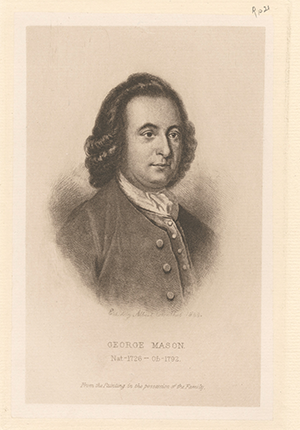Historic Document
Objections to the Constitution of Government formed by the Convention (1787)
George Mason | 1787

Emmet Collection of Manuscripts Etc. Relating to American History, The New York Public Library
Summary
George Mason, member of a prominent Virginia family who had authored Virginia’s Declaration of Rights in 1776, was one of three delegates in Philadelphia (along with fellow Virginian, Edmund Randolph, and Elbridge Gerry) who refused to sign the finished Constitution. Shortly after the Convention adjourned, Mason wrote this memorandum outlining his objections. It soon circulated widely and became the basic template for Anti-Federalist opposition to the Constitution, concisely articulating many of the complaints that would reverberate throughout the ratification struggle: the House of Representatives was too small to represent such a large nation; the President was insufficiently checked; the construction of the judiciary and the sweeping power vested in Congress would spell the end of the state governments; and, perhaps most striking, the Constitution lacked a bill of rights.
Selected by

William B. Allen
Emeritus Dean of James Madison College and Emeritus Professor of Political Science at Michigan State University

Jonathan Gienapp
Associate Professor of History at Stanford University
Document Excerpt
There is no Declaration of Rights; and the Laws of the general Government being paramount to the Laws & Constitutions of the several States, the Declarations of Rights in the separate States are no Security. …
In the House of Representatives there is not the Substance, but the Shadow only of Representation; which can never produce proper Information in the Legislature, or inspire Confidence in the People: the Laws will therefore be generally made by Men little concern’d in, and unacquainted with their Effects & Consequences.— …
The Judiciary of the United States is so constructed & extended, as to absorb & destroy the Judiciarys of the several States; thereby rendering Law as tedious intricate & expensive, and Justice as unattainable, by a great Part of the Community, as in England, and enabling the Rich to oppress & ruin the Poor.— …
The President of the United States has no constitutional Council (a thing unknown in any safe & regular Government) he will therefore be unsupported by proper Information & Advice; and will generally be directed by Minions & Favourites—or He will become a Tool to the Senate—or a Council of State will grow out of the principal Officers of the great Departments; the worst & most dangerous of all Ingredients for such a Council, in a free Country; …
Under their own Construction of the general Clause at the End of the enumerated Powers, the Congress may grant Monopolies in Trade & Commerce, constitute new Crimes, inflict unusual & severe Punishments, and extend their Power as far as they shall think proper; so that the State Legislatures have no Security for the Powers now presumed to remain to them; or the People for their Rights.— …
This Government will commence in a moderate Aristocracy; it is at present impossible to foresee whether it will, in it’s Operation, produce a Monarchy, or a corrupt oppressive Aristocracy; it will most probably vibrate some years between the two, and then terminate in the one or the other.—




